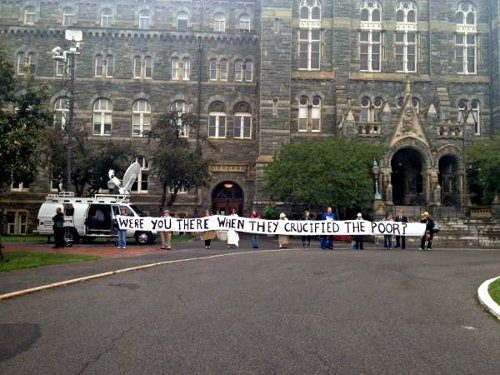
This week: To Be Born – a video short story exploring one woman’s “choice.” Paul Ryan speaks sensibly at Georgetown, result as expected. More background on the LCWR (lest anyone still thinks action was either unnecessary or rash). Our hope is in our young and there is reason to be optimistic. Some good pieces last week on radical feminism. Welcoming our soldiers home. A quote of the week.
To Be Born is a short video about a young woman who becomes pregnant, her struggle alone and the chance not to make the “choice” Planned Parenthood is banking on. This is a very powerful and very touching presentation of the short story A Letter from an Aborted Child.
This film is not excessively gory, but it briefly, dramatically portrays the horror a woman suffers with abortion. The real choice a mother has is well presented. Women who are recovering from an abortion may find it difficult.
Paul Ryan spoke recently at Georgetown (Georgetown = liberal; Georgetown ≠ Catholic) on how Catholic social teaching influenced his budget proposal. He spoke not only of solidarity, but the often ignored principle of subsidiarity. He explained how a vigorous economy helps everyone and how big, central government doesn’t saying “I do not believe that the preferential option for the poor means a preferential option for big government.” Far better than a distant federal bureaucrat deciding what a person needs is “a human being that knows you, that knows your problems, that looks you in the eyes and sees the suffering that you’re experiencing.”
He is absolutely correct. He actually understands Catholic social justice, not the false doctrine incessantly chanted by liberal progressives with their false claims of social justice. Naturally, to borrow a phrase from Father Z, the left threw a “spittle-flecked nutty.” 90 (out of 2,000) of Georgetown’s faculty once again embarrassed themselves in signing a protest letter. Students also organized a protest and were quoted in the liberal media. Satellite TV vans were dispatched to cover the action. One might have thought there was danger of a riot! Here is a wide-angle shot of the protest:

Last week I noted Father Z’s recounting (Nuns Gone Wild: A Trip Down Memory Lane) of the long history of dissent, disobedience and heterodoxy at the Leadership Conference of Women Religious (LCWR). While the service of individual nuns and sisters have often been selfless and loving, their leadership organization has been a source of scandal and divisiveness from Christ’s true Church.
Father Philip Powell has updated his excellent piece on the LCWR mindset as reflected in the content presented at their annual conferences: 8 Themes of the LCWR Worldview.
Also don’t miss these insightful pieces:
- Jeffery Miller’s: Faith and Works and the LCWR
- Jimmy Akin’s interview with Ann Carey (author of Sisters in Crisis)
What do young people hunger for today: relativistic hippie or sacred, reverent liturgy? Father Joseph Kramer, FSSP discusses how the pendulum has swung back:
Several recent pieces take an interesting look at feminism, not in the true sense of the word but as meant by those who typically use it – radical, liberal women.
First up is Patti Maguire Armstrong with her piece for Catholic Lane: Feminism vs. Feminine. She looks at scripture and how feminists twist it to mean exactly the opposite of the truth.
Jennifer Fulwiler wrote about the link of feminism with contraception and abortion. Her piece for the National Catholic Register is Why Do We Call It a “Culture of Death”?
Lastly, Dale O’Leary writing for Crisis Magazine looks at The Oppressed Lives of Stay-at-Home Moms. She explores the feminist underpinning of Obama operative Hilary Rosen’s recent attack on mothers.
After the wives, children, parents and siblings — there are other family members who are ecstatic to see their returning soldiers:
A quote of the week:
The Council did not create new articles of faith, nor did it replace existing ones with new ones. Its only concern was to make it possible to hold the same faith under different circumstances, to revitalize it. As for the work that preceded the Council, it seems to have been more intensive in Germany than elsewhere, for Germany was the heartland of the liturgical movement, the primary source in which the documents of the Council had their origin. But many of these documents were issued too abruptly. To many of the faithful, most of them seemed to be a challenge to the creativity of the individual congregation, in which separate groups constructed their own “liturgies” from week to week with a zeal that was as commendable as it was misplaced. To me, the most serious element in all this was the breach of fundamental, liturgical consciousness. The difference between liturgy and festivity, between liturgy and social event, disappeared gradually and imperceptibly, as witness the fact that many priests, imitating the etiquette of polite society, feel that they ought not to receive Holy Communion until the congregation has received; that they should no longer venture to say “I bless you” [German euch: familiar form of plural “you”] — thus dissolving the fundamental liturgical relationship between them and their congregation. In this context belong also the often obnoxious and banal greeting which, it must be admitted, many congregations tolerate with a kind of patient forbearance. In the period before the new missal made its appearance, but after the old one had already been characterized as “old-fashioned,” people forgot that there is a “rite,” that is, a prescribed liturgical form, and that liturgy is genuinely liturgy only if it is not subject to the will of those who celebrate it.
Pope Benedict XVI
The Feast of Faith
Some random thoughts or bits of information are worthy of sharing but don’t warrant their own full post. This idea was started by Jennifer Fulwiler at Conversion Diary to address this blogging need. So, some Fridays I too participate when I have accumulated 7 worthy items. Thank you Jen for hosting this project!
























Share Your Thoughts